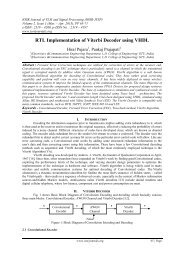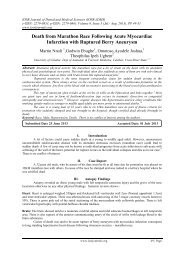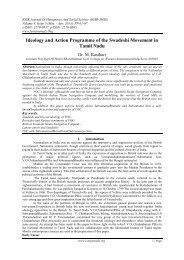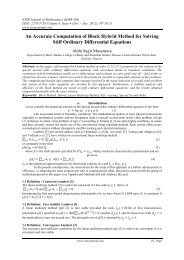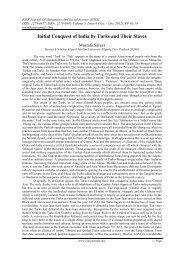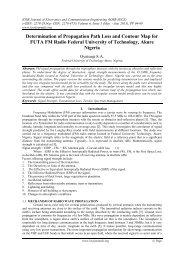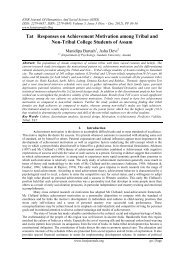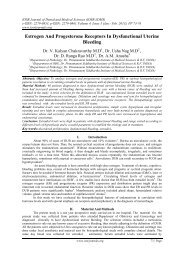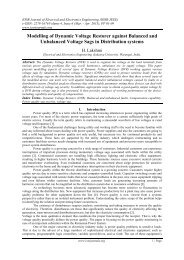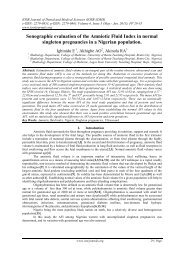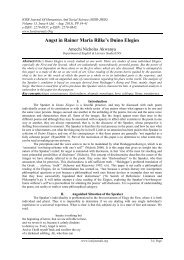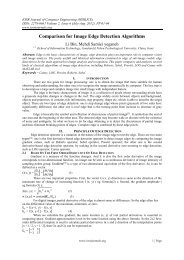Design Compatibility of Classroom Furniture in Urban and ... - IOSR
Design Compatibility of Classroom Furniture in Urban and ... - IOSR
Design Compatibility of Classroom Furniture in Urban and ... - IOSR
You also want an ePaper? Increase the reach of your titles
YUMPU automatically turns print PDFs into web optimized ePapers that Google loves.
The Impact Of Corporate Governance And Leadership On Entrepreneurship Development In Nigeria<br />
effectiveness <strong>of</strong> the company's system <strong>of</strong> account<strong>in</strong>g <strong>and</strong> <strong>in</strong>ternal control; mak<strong>in</strong>g recommendations to the<br />
Board regard<strong>in</strong>g the removal <strong>and</strong> remuneration <strong>of</strong> external auditors; <strong>and</strong> authoriz<strong>in</strong>g the <strong>in</strong>ternal auditor to carry<br />
out <strong>in</strong>vestigation <strong>in</strong>to any activities <strong>of</strong> the company which may be <strong>of</strong> <strong>in</strong>terest or concern to it.<br />
Liabilities <strong>and</strong> Sanctions for Directors who Fail to Perform<br />
The AGM with its power to appo<strong>in</strong>t <strong>and</strong> remove directors as well as approve their remuneration is<br />
expected to act as check on the performance <strong>of</strong> directors. Accord<strong>in</strong>gly directors will endeavour to br<strong>in</strong>g to the<br />
AGM results that will w<strong>in</strong> the approval <strong>and</strong> commendation <strong>of</strong> shareholders. Besides, certa<strong>in</strong> sections <strong>of</strong> the<br />
company law prescribe penalties for err<strong>in</strong>g directors <strong>and</strong> <strong>of</strong>ficers <strong>of</strong> the company. For example, Section 348 <strong>of</strong><br />
CAMD prescribes the penalty for each director <strong>of</strong> any company that lays a faulty f<strong>in</strong>ancial statement before any<br />
meet<strong>in</strong>g <strong>of</strong> shareholders. If the company is <strong>in</strong> liquidation, for example, Section prescribes the <strong>of</strong>fences that can<br />
be committed by <strong>of</strong>ficers <strong>of</strong> the company antecedent to or <strong>in</strong> the course <strong>of</strong> w<strong>in</strong>d<strong>in</strong>g up. Section 503 prescribes<br />
penalty for falsification <strong>of</strong> company books; Section 504, for frauds while See prescribes the liability for not<br />
keep<strong>in</strong>g proper accounts.<br />
Section 507 prescribes the power <strong>of</strong> law courts to assess damages del<strong>in</strong>quent directors while the<br />
prosecution <strong>of</strong> del<strong>in</strong>quent <strong>of</strong>ficers <strong>and</strong> members <strong>of</strong> the company is provided for <strong>in</strong>*Section 508 <strong>of</strong> CAMD.<br />
3.5 THEORIES OF ENTREPRENEURSHIP<br />
Several theories have been developed over the years <strong>in</strong> attempts to explore <strong>and</strong> expla<strong>in</strong> the<br />
entrepreneurship phenomenon. These <strong>in</strong>clude among others, economic, socio-cultural, managerial, educational,<br />
developmental, experiential, <strong>in</strong>novation, network, structural <strong>and</strong> multi-dimensional theories. Each <strong>of</strong> these<br />
theories had been used <strong>in</strong> the study <strong>of</strong> the processes <strong>of</strong> entrepreneurship.<br />
Economic Theory: The economists see the entrepreneurship as the man who perceives bus<strong>in</strong>ess opportunities<br />
<strong>and</strong> takes advantage <strong>of</strong> scare resources to use them. Relevant, therefore, are the structure <strong>of</strong> economic <strong>in</strong>centives<br />
that are available <strong>in</strong> the market. Writers on this approach <strong>in</strong>clude (Schumpeter, 1934; <strong>and</strong> Drucker, 1985). The<br />
patterns <strong>of</strong> economic <strong>in</strong>centives have acted as stimuli for the emergence <strong>of</strong> entrepreneurs. They have also<br />
<strong>in</strong>fluenced the positive responses <strong>in</strong> terms <strong>of</strong> behavior <strong>and</strong> their performance (Kilby, 1965; <strong>and</strong> S<strong>in</strong>gh, 1985).<br />
Socio-Cultural Theory: The socio-cultural approach sees entrepreneurship as a social role <strong>and</strong> entrepreneurial<br />
development as a function <strong>of</strong> the form <strong>of</strong> society <strong>and</strong> the characteristics <strong>of</strong> culture. The socio-cultural<br />
environment have aided entrepreneurship by provid<strong>in</strong>g funds, bus<strong>in</strong>ess ideas, valuable <strong>in</strong>formation <strong>and</strong> other<br />
forms <strong>of</strong> social supports, thus directly <strong>in</strong>fluenc<strong>in</strong>g the processes <strong>of</strong> emergences, behaviour <strong>and</strong> performance <strong>of</strong><br />
entrepreneur.<br />
Political Theory: The <strong>in</strong>fluence <strong>of</strong> the political factor on eh emergence, behaviour <strong>and</strong> performance <strong>of</strong><br />
entrepreneurs had been reported by several writers. Schatz (1962 <strong>and</strong> 1964) discussed tow forms <strong>of</strong> asstiance<br />
that were provided for <strong>in</strong>digenous entrepreneurs by government <strong>in</strong> Nigeria. These were (1) the f<strong>in</strong>ancial support<br />
through the Federal Loan Board <strong>and</strong> (2) the establishment <strong>of</strong> the Yaba Industrial Estate for use by <strong>in</strong>digenous<br />
entrepreneurs. Ogundele (2000) discussed the provision <strong>of</strong> tra<strong>in</strong><strong>in</strong>g <strong>and</strong> f<strong>in</strong>ancial asstiance by government to<br />
<strong>in</strong>digenous entrepreneur through National Directorate <strong>of</strong> Employment (NDE). Government by way <strong>of</strong><br />
legislations <strong>and</strong> provision <strong>of</strong> <strong>in</strong>frastructure <strong>and</strong> other support system have aided the entrepreneurial process.<br />
Managerial Theory: This perceptive focuses on the perception <strong>of</strong> market opportunities. It <strong>in</strong> addition emphases<br />
the operational skills requires to run a successful enterprises. Kilby (1971) listed thirteen managerial functions,<br />
which the entrepreneurs might have to perform for the successful operation <strong>of</strong> their strategic manag<strong>in</strong>g practices<br />
as the function <strong>of</strong> entrepreneurs. Therefore managerial skills will have direct positive effect on the<br />
entrepreneurship processes <strong>of</strong> emergence, behaviour <strong>and</strong> performance. The environment that provides<br />
opportunities for relevant skills acquisition will tend to promote entrepreneurship.<br />
Development Theory: This approach views entrepreneurship as an extension <strong>of</strong> the process <strong>of</strong> occupational<br />
choice <strong>in</strong> the <strong>in</strong>dividuals. This <strong>in</strong> turn is part <strong>of</strong> the <strong>in</strong>dividuals‟ total striv<strong>in</strong>g for an adequate life adjustment,<br />
<strong>and</strong> as such supportive tra<strong>in</strong><strong>in</strong>g <strong>and</strong> development must be given to such <strong>in</strong>dividuals (1990). The developmental<br />
approach focuses on the development <strong>of</strong> entrepreneurial skills. At the macro level, it <strong>in</strong>volves tra<strong>in</strong><strong>in</strong>g <strong>in</strong><br />
opportunity awareness, relat<strong>in</strong>g to relevant publics technology, market <strong>and</strong> deal<strong>in</strong>g with government agencies.<br />
At the micro level, areas <strong>of</strong> focus <strong>in</strong>clude attitudes, motivation, education <strong>and</strong> work experience. This approach<br />
envisaged the positive effects <strong>of</strong> tra<strong>in</strong><strong>in</strong>g <strong>and</strong> development on several determ<strong>in</strong>ants that effect entrepreneurs. The<br />
National Directorate <strong>of</strong> employment (NDE) <strong>in</strong> Nigeria adopted this approach <strong>and</strong> also provided fund for tra<strong>in</strong>ed<br />
entrepreneurs. Thus, it provides both developmental <strong>and</strong> f<strong>in</strong>ancial opportunities.<br />
www.iosrjournals.org<br />
55 | Page



